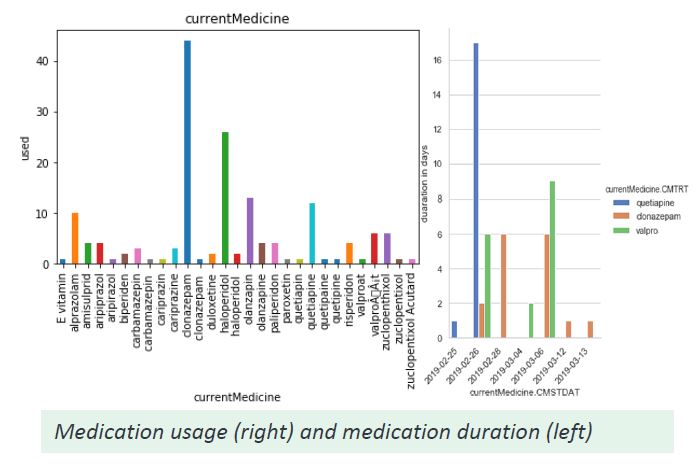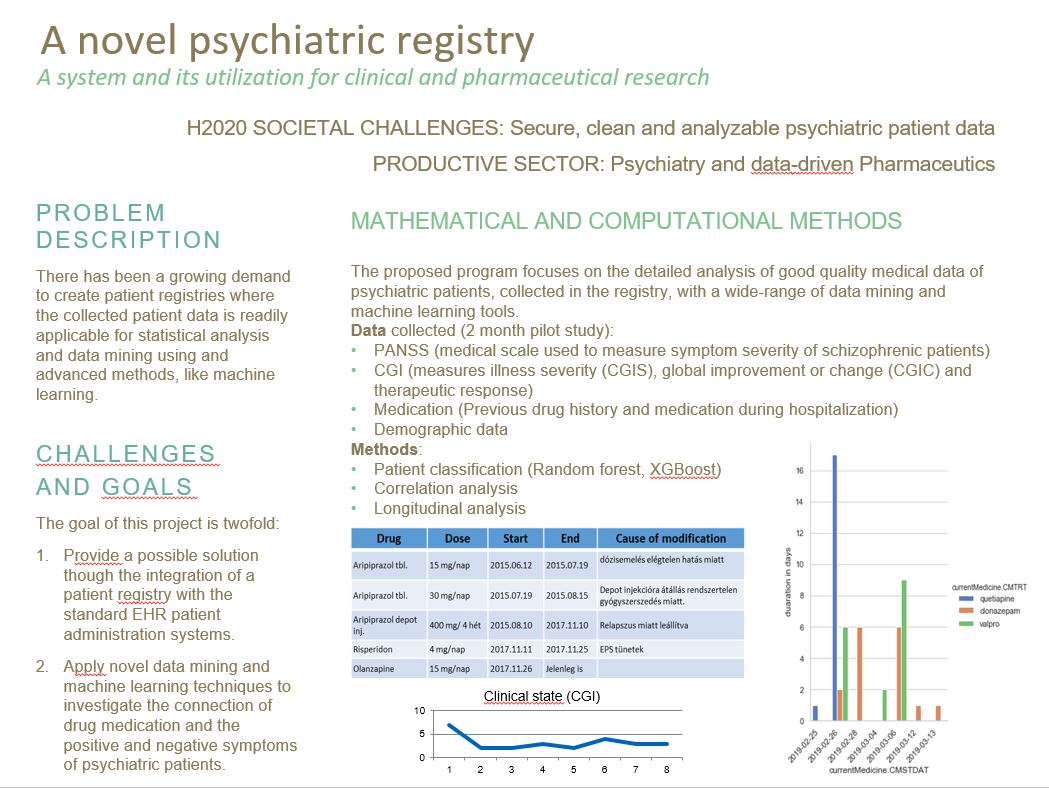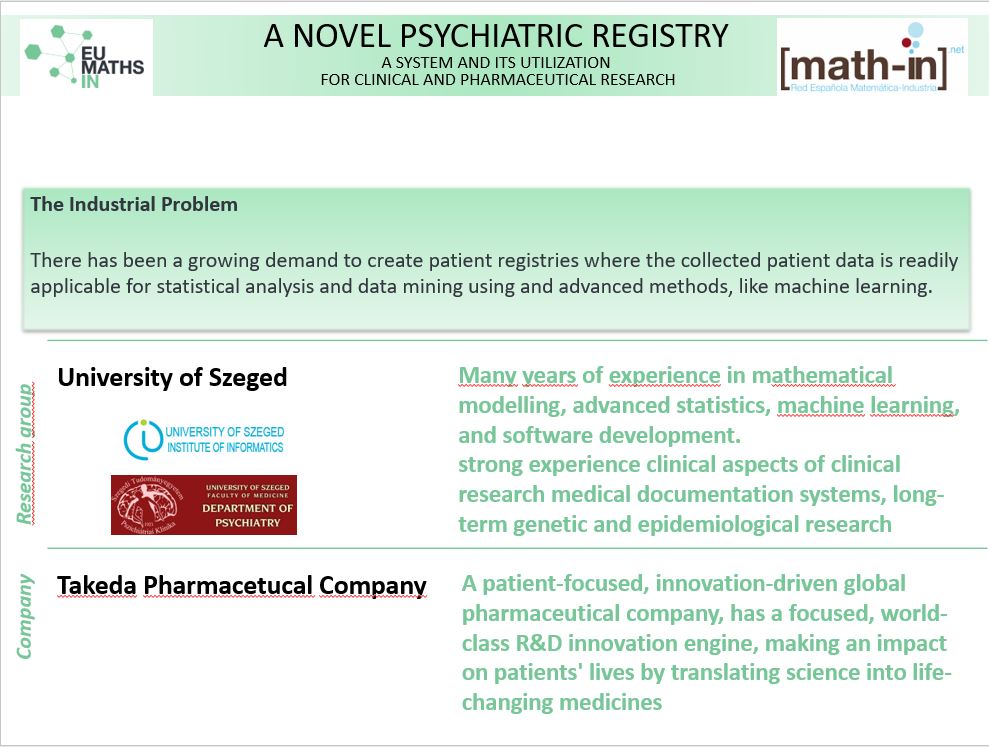 Kutatás vezetői: Pluhár András (szenior) és London András (fiatal kutató)
Kutatás vezetői: Pluhár András (szenior) és London András (fiatal kutató)
Intézmény: University of Szeged
Leírás: Az utóbbi évtizedben egyre nagyobb igény merült fel betegregisztrációs adatbázisok létrehozására. Ezek célja a betegkezeléssel kapcsolatos adatok strukturált tárolása, mely lehetővé teszi statisztikai, adatbányászati és modern gépi tanulási módszerek azonnali alkalmazhatóságát. Ugyanakkor ezen adatbázisok elterjedése eddig erősen korlátozott volt, mivel plusz terhet hárítanak az ellátást végző szakorvosokra a kötelező adminisztrációs terhek mellett. Projektünk célja kettős: egyrészt fejleszteni egy pszichiátriai betegregisztrációs adatbázist és megoldani az integrációját a használatban lévő adminisztrációs (EHR rendszerrel. Ezután az adatbázisban gyűjtött adatok elemzése legújabb adatbányászati és gépi tanulási eszközökkel, vizsgálva első sorban a gyógyszeres kezelés és a pszichiátriai betegek pozitív és negatív szimptómáinak kapcsolatát.
Industrial partner: Takeda Pharmaceutical Company, contact person: Sándor Szalma (Global Head, Computational Biology, email: Sandor.Szalma@takeda.com)
Clinical cooperation: János Kálmán (MD, PhD, Director of Psychiatric Clinic, Univ. Szeged), Andor Kanka (MD, senior researcher, Psychiatric Clinic, Univ. Szeged)
Summary: There has been a growing demand to create patient registries where the collected patient data is readily applicable for statistical analysis and data mining using and advanced methods, like machine learning. On the other hand, the development and spread of them is yet highly limited due to the significant additional extra effort needed besides e.g. the daily patient care and other administrative tasks. The goal of this project is twofold: a) provide a possible solution though the integration of patient registries with the standard EHR patient administration systems; b) apply novel data mining and machine learning techniques to investigate the connection of drug medication with the positive and negative symptoms of psychiatric patients.
Within the framework of a HU-MATHS-IN mini project (started in 2018) we have started to develop a patient registry with the goal of efficiently collecting, storing and analyzing data of psychiatric patients. Although we admit that this phase of the project was software-development heavy, mainly due to the specialties of medical and pharmaceutical research and regulations for handling medical data, our first experiments in a pilot project concerning symptoms (positive and negative) of schizophrenic patients were promising. We should also mention that the usability of the registry is not restricted to the psychiatric domain and it is designed to be applicable in various fields in medicine. Our group has been contacted by a neuroscience research group at the Univ. Szeged who are also interested in using our system.
Related to the project, a joint presentation with the industrial partner were given in the “Bio-IT World Conference & Expo” in Boston. That is one of the biggest conference worldwide in the topic. Besides, the project team and the clinical partner presented the developed system and possibilities of its utilization in various Hungarian IT, medicine and medical-it systems forums and conferences. András London gave a session invited talk at the 19th “Conference of the European Network for Business and Industrial Statistics”, in Budapest. Andor Kanka (MD), our partner and expert from the Department of Psychiatry at the Univ. Szeged presented a poster of our work in Schizophrenia Academy International Conference in Budapest.
We also submitted a paper where we present our experiences through the development of a psychiatric patient registry, its integration to health administration systems and in data mining to investigate the effects of negative symptoms of schizophrenia. The paper is organized as follows. We first describe the purpose and scope of the registry, present its main features and specify general and technical requirements. Then we briefly discuss the architecture of the system and the currently available functions with use cases. The first steps and experiences of the integration with the MedSol HER system are also discussed. Finally, we present our first study and data mining results using the registry, outline our future plans and draw some further conclusions.
As a continuation we submitted a new HU-MATS-IN (EFOP-3.6.2-16-2017-00015) mini project with the title “Application of advanced mathematical models and machine learning methods to analyze psychiatric disorders”. The proposed program focuses on the deep mathematical analysis of a wide-range good quality medical data of psychiatric patients. A large data-set has been provided by the industrial partner, and the main goal is to investigate the applicability of the above mentioned methods and their modified versions on medical data in detail. We are planning to summarize and review that what are the best practice solutions for analyzing certain types of data, highlight the main differences between the methods when applying them, regarding advantages and disadvantages when comparing them.


